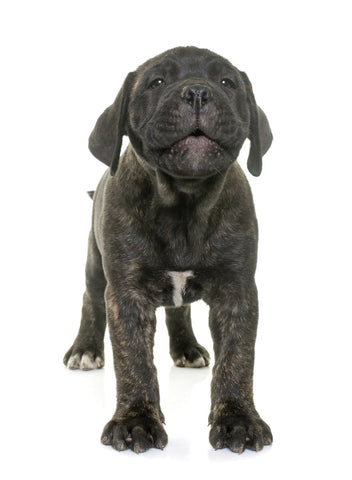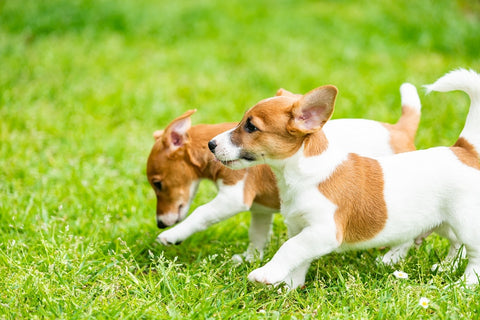Are you a proud owner of an adorable puppy? Is this a new experience for you and are unsure what normal puppy behavior is like? Well, puppies, just like human beings adopt bad habits, which are due to a number of reasons. Dog ID Collar is here to address puppy behavior and tips on dealing with your new four-legged best friend.
Puppies are given love and affection constantly, which is important but can sometimes lead to the hampering of good habits. Just like a baby when he or she needs to be changed or fed, they cry, but in other cases, they do so just to be held. This can be great, but it does not always help the young one to grow and become social with other individuals. Well, puppies are similar and need to learn good behavior in order to grow into great dogs.
The first step to solving and preventing bad dog behavior is by thoroughly understanding the problems. That being said, here's a deeper look at some of the common puppy behavior problems and how to prevent or better control them:
7 Puppy Behaviors and How to Handle Them
Barking
 -Alert or warningDogs vocalize in one way or another. They can whine, howl, bark, etc., but excessive barking is considered a puppy behavior issue. However, before you can embark on correcting excessive barking, it's important to determine why your puppy is vocalizing. Common forms of barking include:
-Alert or warningDogs vocalize in one way or another. They can whine, howl, bark, etc., but excessive barking is considered a puppy behavior issue. However, before you can embark on correcting excessive barking, it's important to determine why your puppy is vocalizing. Common forms of barking include:
-Attention seeking
-Response to other dogs
-Boredom
-Anxiety
-Excitement or playfulness
To control excessive barking, you should teach the bark and quiet commands. Be dedicated, patient and consistent as this puppy behavior takes time to address. Don’t give up!
Digging
When given the chance, most puppies will engage in digging. It is a matter of instinct, but it is more prevalent in breeds like terriers, due to their hunting history. Generally, dogs dig for the following reasons:
-Hunting instinct
-Fear or anxiety
-Excess energy or boredom
-Gain access or escape an area
-Desire to hide items
It can be rather frustrating if your little friend likes to dig up the yard. To resolve this behavior, you need to first determine the cause of digging. Then spend more quality time with the puppy and ensure they get more exercise. If the behavior doesn't seem to go away, set aside a space like a sandbox, where they can freely dig and train the pet that it's only acceptable to dig in that area only.
Chewing
This is another natural action for all puppies and an important one for most dogs. However, excessive chewing can become a concerning behavior issue as it makes your dog destructive. Some of the most common reasons puppies chew include:
-Anxiety
-Puppy teething
-Curiosity
-Excess energy or boredom
To deal with this puppy behavior, you should encourage the puppy to chew on the right things by providing chew toys. Also, keep personal items out of reach. When not at home, keep the pet confined to a place where they can cause the least destruction.
If you catch your puppy chewing the wrong item, instantly react with a sharp noise and replace it with a chew toy. Plenty of exercises is also important as it helps wear off the energy that could have been used for chewing.
Chasing
Dogs always have a desire to chase moving items and this is nothing more than a display of predatory instinct. Most dogs will chase people, cars and other animals and this can result in devastating outcomes. You may not have the ability to stop your puppy from attempting to chase, but there are a few steps you can take to prevent disaster. These include:
-Keeping the puppy on a leash or confined
-Having a dog whistle on hand to get their attention.
-Staying vigilant for potential triggers such as joggers
-Training your puppy to come when called.

The best way to succeed in this is to prevent the chase from getting out of control. Constant training on an extended period will teach the puppy to focus on you first before running off.
Stealing
Luckily, this is a problem that's easy to deal with as your puppy cannot steal what they cannot reach. However, this means that fixing this puppy behavior is on you. You should always be on the lookout for what is considered fair game: open closet doors, accessible garbage cans, food that's left anywhere within reach, and much more. Ideally, you should make appropriate items of the pet's desire available, including chew toys.
Also, play with your pet using those toys, so that they develop a liking to just those items. When he or she steals, avoid chasing after as it will seem like a game to them. Ask them to leave it as you open the mouth to remove the item. However, you should be careful as some puppies can be overly aggressive. If the latter is the case, leave them and commit to working with a professional dog behaviorist or trainer.
Inappropriate Elimination
Defecation and urination when uncalled for is one of the most frustrating puppy behaviors. They can damage some parts of your home and even make your pet unwelcome at other people's homes and public places. First and foremost, you should discuss this puppy behavior with your vet in order to rule out health issues. If there's no medical concern, then try and determine the underlying reason, which could be one of the following:
-Territorial marking
-Lack of ideal housebreaking
-Submissive urination
-Anxiety
It is important to note that inappropriate elimination is normal in puppies under 12 weeks old. However, dogs that are older than this call for serious behavior modification as it can easily become engrained. At this stage, it is best to work with an experienced dog trainer.
Begging
This is another common puppy behavior problem that most owners, unfortunately, encourage. It can result in digestive issues and even obesity. Puppies like to beg because they like food, but food doesn't equate to love. As a dog lover, it can be easy to give in to that longing look, but doing so creates a behavior issue down the road. Once you teach your pet that begging is allowed, you will only be sending the wrong message.
Before you eat, send your puppy to its place and if necessary, confine him or her to another room. If it behaves, give a treat reward, but only after you have finished eating.
Dog ID Collar is here to help you throughout the new puppy behavior process. Don’t get discouraged. Call us with any questions or concerns. With a new puppy, comes the need for a new dog collar and leash. Make sure you check out our personalized and embroidered dog collars and leashes today!
